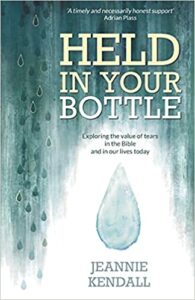Tears through the Bible and in Our Lives Today
How comfortable are you with tears — your own tears and the tears of others? I remember as a teenager being shaken, in fact stunned at the first Hindu funeral I ever attended. There was a very loud and public outpouring of tears and grief at the tragic death of a young mother. In complete contrast, in our western culture, when people cry, they usually apologise, as though they have caused offence.
It’s fascinating when someone takes an unusual theme running through the books of the Bible, and then uses it to reflect back on modern-day life. That’s what Jeannie Kendall does in her new book, Held in Your Bottle: Exploring the Value of Tears in the Bible and in Our Lives Today. Jeannie points out that in scripture, tears flow freely and often. And it’s not a male / female thing either. Joseph in Genesis holds the record of weeping the most, seven times in all. And even Jesus is not embarrassed to shed tears in public as he weeps over Jerusalem, weeps at the tomb of his friend Lazarus, and weeps in the Garden of Gethsemane. If it’s OK for Jesus to cry, surely, it’s OK for us?
The book is an exploration of the different kinds of tears that occur in scripture. Eleven are listed from tears of joy, tears of loss, tears of goodbye (think of Naomi and Ruth) to tears of friendship (David and Jonathan). There’s also tears of anger (Jesus at the tomb of Lazarus) and tears of stress (Paul’s constant anxiety for the churches). Dramatic retellings of these Bible stories are placed alongside modern-day true stories of people who weep.
Through the microscope — tears of laughter by Rose-Lynn Fisher
Here’s just one of the less obvious tears in the Bible.
Tears of Regret
You may recall the story of Esau and his con-artist twin-brother Jacob in Genesis 25 and 27. Esau is the older brother, though only by seconds, and should, according to the local culture, inherit the “elder brother birth-rights”. One day, however, Esau returns from hunting, exhausted and famished, to find Jacob who, being a homely type, has been inside all day cooking a delicious stew. As the wonderful fragrances from the stove reach Esau, he becomes ravenous. “Give me some of that — I’m dying of hunger,” he says to Jacob. Jacob indeed offers him a bowl of stew but demands in return Esau’s rights as the firstborn son. Esau, not thinking this through, agrees, enjoys his stew, and then forgets about the whole thing. However, a couple of pages later in Genesis, we find Esau’s tears, deep tears of regret as he has to face his new life as a “second-born son”.
We may find this story absurd! How immature! How foolish to give away your birthright for a bowl of soup! But as the book reminds us, we too are sometimes taken over by appetite, perhaps for food, perhaps for something else. Many of us, for a moment of pleasure, have done things in life we later regret. Caught in the moment, we also can be too impatient, hungry or aroused to stop and think through the consequences of our actions.
Regrets, says the author, can be for many reasons. In the short term, our regrets tend to be for things we have done, for example worrying too much about what other people might think, or simply wasting time. In contrast, long-term regrets tend to be for things we did not do, for example, missed opportunities through nerves, not reconciling with someone before they died, or not speaking up when we had the chance to.
Moving through the many human conditions that give rise to tears, this book weaves an insightful thread through scripture and through life. On the way, it raises some very practical questions. For example, at Christian funerals, do we somehow miss out on the depth of emotional experience, the need to lament, by immediately leaping to a “celebration of life”? Do we blot out authentic and therapeutic grief with well-meant comments like: “they’re with the Lord now … (let’s move on)”? “Yes, they ARE with the Lord”, says the author, “but they’re not with you, so it’s OK to weep”.
Through the microscope — grief tears by Rose-Lynn Fisher
When is it good to not weep?
We live in a culture where public tears are often discouraged, but there is also something important in the privacy of tears. Sometimes it’s good to not cry, or to cry in private. For many people the loss of dignity they feel on weeping is awkward and unhelpful. Some people need to draw a line
between public grief and private grief, and we need to maintain a space for people to do what’s right for them. Churches need to be places where people feel free to cry and free to refrain from crying. Similarly, there are times when we may feel called to “hold it together” and manage our grief for the sake of others.
There are other intriguing questions raised by this book: did tears come into the world through the fall or have they always been there? And will all tears end at the culmination of all things, as Rev 21 tells us, “he will wipe away every tear”? So are there no tears in Heaven? … Are there tears in God?
Overall this is an honest, vulnerable, and practical book that affirms the positive role of our tears in the Bible in life, and in faith. As the author says: “one of the wonderful things about the Christian faith is that God both honours and chooses to use our humanity”, and that must include our tears.





Thanks Chris
A well written and interesting article agian
Thanks mate
Thanks for this Chris.
One of my members has asked if you could send the tour through the Bible Thanks Chris